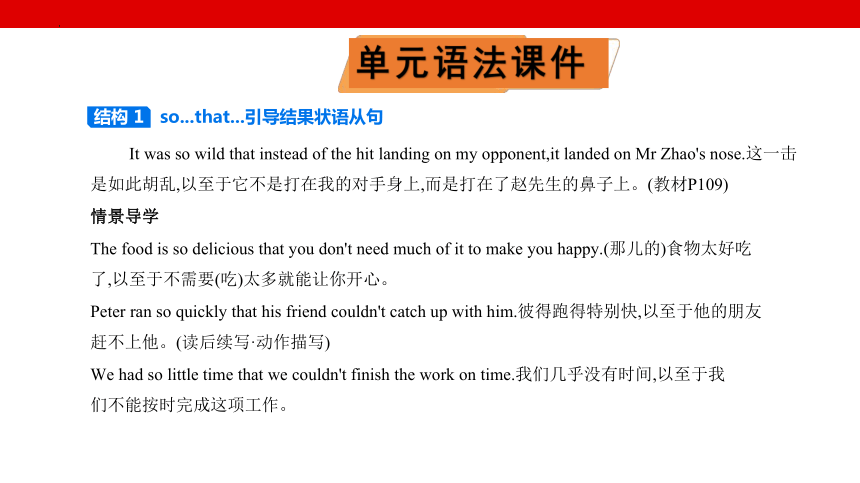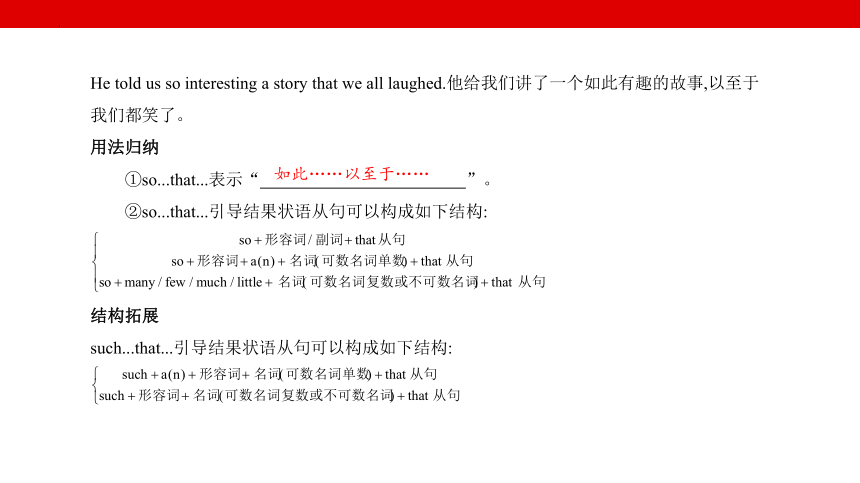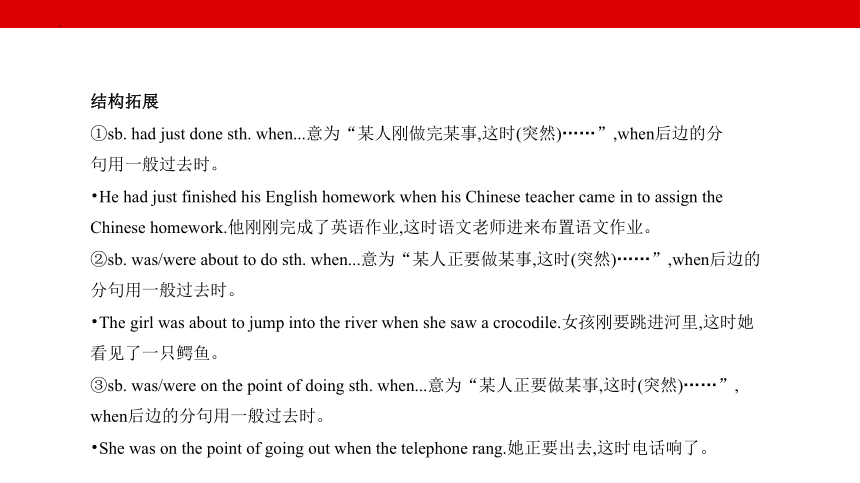北师大版(2019)选择性必修第二册Unit 4 Humour 单元知识点课件(共25张PPT)
文档属性
| 名称 | 北师大版(2019)选择性必修第二册Unit 4 Humour 单元知识点课件(共25张PPT) |  | |
| 格式 | pptx | ||
| 文件大小 | 2.0MB | ||
| 资源类型 | 教案 | ||
| 版本资源 | 北师大版(2019) | ||
| 科目 | 英语 | ||
| 更新时间 | 2024-04-21 22:15:56 | ||
图片预览









文档简介
(共25张PPT)
单元语法课件
Unit 4 Humour
It was so wild that instead of the hit landing on my opponent,it landed on Mr Zhao's nose.这一击
是如此胡乱,以至于它不是打在我的对手身上,而是打在了赵先生的鼻子上。(教材P109)
情景导学
The food is so delicious that you don't need much of it to make you happy.(那儿的)食物太好吃
了,以至于不需要(吃)太多就能让你开心。
Peter ran so quickly that his friend couldn't catch up with him.彼得跑得特别快,以至于他的朋友
赶不上他。(读后续写·动作描写)
We had so little time that we couldn't finish the work on time.我们几乎没有时间,以至于我
们不能按时完成这项工作。
结构 1 so...that...引导结果状语从句
单元语法课件
He told us so interesting a story that we all laughed.他给我们讲了一个如此有趣的故事,以至于
我们都笑了。
用法归纳
①so...that...表示“ ”。
②so...that...引导结果状语从句可以构成如下结构:
结构拓展
such...that...引导结果状语从句可以构成如下结构:
如此……以至于……
She is such a clever girl that every teacher likes her.她是如此聪明的一个女孩子,以至于每个
老师都喜欢她。
The doctors and nurses are such dedicated people that they win the respect of the people.医生
和护士是如此富有献身精神的人,以至于他们赢得了大众的尊重。
特别提醒
①当名词前有little时,若little 意为“少的”,表数量,则其前用so修饰;若little 意为“小的”,则
用such 修饰。
They are such little children that they can't understand what you say sometimes.他们是那么小的
孩子,有时候他们不理解你说的是什么。
②当“so/such...”位于句首时,主句用倒装结构。
So famous a man is he that everyone knows him in our town.他是一个如此有名的人,以至于我
们镇上的每个人都认识他。
He makes an attempt to eat it, but it is clear from the look on his face as he is chewing that he
finds the taste truly awful.他试图吃掉它,但从他咀嚼时脸上的表情可以清楚地看出,他觉得味
道真的糟糕。(教材P15)
情景导学
It is obvious that the movie The Battle at Lake Changjin has won the heart of the audience.很明
显,电影《长津湖》赢得了观众的心。
It is important that we should learn English well.我们学好英语是很重要的。
用法归纳
“It is+形容词+that...”句型中,that引导 ,It是 。
结构 2 It is+形容词+that从句
主语从句
形式主语
结构拓展
①It is+名词/过去分词+that从句
It is our hope that in coming decades, advances in science will offer new perspectives from
which to study how people manage their lives.我们希望在未来几十年中,科学的进步将为研究
人们如何管理自己的生活提供新的视角。
②It is+形容词+(for sb.) to do sth.
It is easier to avoid a discussion, but risking talking about it may eventually lead to a better
outcome.虽然避免讨论较容易,但冒险谈论它最终可能会带来更好的结果。
One unfortunate agent was dealing with all the passengers, when an angry man, who had been
standing in line for some time, pushed his way to the front.一名不幸的代理人正在应付所有的
乘客,这时一名排队等候了一段时间的愤怒的男子挤到了前面。(教材P18)
情景导学
The two girls were preparing the breakfast when the telephone rang.这两个女孩正在准备早餐,
这时电话响了。 (读后续写·情节描写)
用法归纳
was/were doing sth. when...意为“过去正在做某事,这时(突然)……”,when作并列连词,
连接两个并列分句,后边的分句用 。
结构 3 was/were doing sth. when...正在做某事,这时……
一般过去时
结构拓展
①sb. had just done sth. when...意为“某人刚做完某事,这时(突然)……”,when后边的分
句用一般过去时。
He had just finished his English homework when his Chinese teacher came in to assign the
Chinese homework.他刚刚完成了英语作业,这时语文老师进来布置语文作业。
②sb. was/were about to do sth. when...意为“某人正要做某事,这时(突然)……”,when后边的
分句用一般过去时。
The girl was about to jump into the river when she saw a crocodile.女孩刚要跳进河里,这时她
看见了一只鳄鱼。
③sb. was/were on the point of doing sth. when...意为“某人正要做某事,这时(突然)……”,
when后边的分句用一般过去时。
She was on the point of going out when the telephone rang.她正要出去,这时电话响了。
进行时态:现在完成进行时、
过去完成进行时、将来进行时
一、现在完成进行时
1.现在完成进行时的构成
情景导学
I have been writing the book all year.
用法归纳
现在完成进行时的构成为① ,它的否定形式为have/has not been do-
ing。
have/has been doing
2.现在完成进行时的用法
(1)强调动作的持续性
情景导学
I have been waiting for him for the past 2 hours.
Have you been looking for your book all night
They have been working on their project since they arrived.
用法归纳
现在完成进行时表示动作从过去某一时间开始,一直持续到现在并有可能继续下去,或
者始于过去,现在刚刚终止,但注重的是结果。常与all this time、this week/month、all night/
morning/afternoon等时间状语及② 或for引出的时间状语连用。
since
(2)表示动作重复
情景导学
She has been running in a lot of races recently.
We have been discussing the matter this year.
I haven't been sleeping well lately.
用法归纳
有时现在完成进行时所表示的动作并不是一直在不停地进行,而是在断断续续地③
。常与表示“最近”意义的副词lately、recently等连用。
(3)表示某种感彩
情景导学
Too much has been happening today.
Recently she has always been helping me.
重复
用法归纳
现在完成进行时有时带有强烈的表扬或厌恶等感彩,常表达愿望或感慨。
3.现在完成进行时和现在完成时的区别
情景导学
I have been thinking it over.(持续性)
I have thought it over.(影响或结果)
I have been visiting your hometown recently.(动作重复)
I have visited your hometown recently.(动作完成)
用法归纳
(1)现在完成时表示动作④ ,强调动作的结果或影响。
(2)现在完成进行时表示动作在迄今为止的一段时间内持续进行,并有可能继续进行下去,强
调动作的⑤ 或带有某种感彩。
已经完成
持续性
二、过去完成进行时
1.过去完成进行时的构成
情景导学
Everything had been going wrong for him.
So, after he had been feeling depressed for over a month, he decided to go to the doctor.
Finally, after he had been waiting for about half an hour, he was called in for his consultation.
When I first met Jane, she had been working in that school for 10 years.
They said they had been having a match with Class One.
I had been walking around all morning before I found her.
用法归纳
过去完成进行时表示从过去某一时间开始并持续到过去另一时间的动作。过去完成进行时
的构成为⑥ 。
2.过去完成进行时和过去完成时的区别
情景导学
He said he had read the book.(表示已经读完)
He said he had been reading the book.(在说之前一直在读或反复读)
用法归纳
(1)过去完成时的形式为⑦ ,表示过去的过去发生的动作或存在的状态,动作一般已
经结束,侧重事情的结果。
(2)过去完成进行时表示从过去的过去一直持续到过去的某个时刻的动作,或者过去的过去
反复发生的动作,侧重事情的持续性。
had been doing
had done
三、将来进行时
1.将来进行时的构成
情景导学
I will be working in the United States for three months.
This time next week, I'll be arriving in New York.
By this time next month, we will be lying on the beach sunbathing.
It is no use trying to see him at six this evening, because he will be giving a lesson then.
If you don't call back, they will be wondering what has happened to you.
用法归纳
将来进行时表示在将来某一时间持续进行的动作。将来进行时的构成为⑧
。
will be doing
2.将来进行时和一般将来时的区别
情景导学
What will you be doing this time tomorrow (将来正在做的事)
What will you do tomorrow (将来要做的事)
When will you pay back the money (似乎在直接讨债)
When will you be paying back the money (委婉地商量)
Mary won't pay this bill.(不愿意付账)
Mary won't be paying this bill.(仅表示将来)
用法归纳
(1)将来进行时表示将来某一时间⑨ 的动作,一般将来时表示未来某时将要
发生的动作。
(2)两者均可表示将来,但用将来进行时语气更委婉。
正在进行
(3)一般将来时还可表示意图,而用将来进行时则只是单纯地谈论未来的情况。
副词
一、副词的作用
情景导学
She speaks softly.
She is very beautiful.
She runs extremely fast.
用法归纳
副词用来修饰动词、⑩ 或副词,通常表示方式、地点、时间、频率和程度。
形容词
二、副词的分类
1.方式副词
情景导学
The little girl played happily.
Please check your work carefully before you hand it in.
用法归纳
方式副词表示一件事情是如何做的,常见的方式副词有 、sadly、loudly、
softly、quickly、easily、carelessly、carefully、politely、firmly等。
2.地点副词
情景导学
The party will take place here.
They ran outside.
happily
用法归纳
地点副词表示事情发生的地点,常见的地点副词有here、there、ahead、nearby、down-
stairs、downtown、somewhere、abroad、behind、inside、outside等。
3.时间副词
情景导学
We saw the film yesterday.
They will arrive soon.
用法归纳
时间副词表示事情发生的时间,常见的时间副词有now、tomorrow、recently、tonight、
soon、before、early、immediately、yesterday等。
4.频率副词
情景导学
We visit our family often.
We rarely go to town.
用法归纳
频率副词表示事情发生的频率,常见的频率副词有regularly、always、often、seldom、
sometimes、never、 、usually、occasionally等。
5.程度副词
情景导学
They were very pleased with the result.
He was absolutely delighted with the outcome.
rarely
用法归纳
程度副词表示事情发展的程度,常见的程度副词有too、almost、very、entirely、ex-
tremely、slightly、absolutely、hardly、quite、largely和greatly等。
6.疑问副词
情景导学
How often do you go shopping
Where do you come from
Why do you like it
用法归纳
疑问副词主要用来构成特殊疑问句,常见的疑问副词有how、where、when、why等。
7.关系副词
情景导学
He lived in the countryside where he enjoyed the fresh air.
I will remember the day when I met her for the first time.
用法归纳
关系副词主要用来引导定语从句,常见的关系副词有when、where、why等。
8.评论副词
情景导学
Fortunately, he passed the driving test.
Actually, I don't remember her phone number.
用法归纳
评论副词一般用来修饰句子,常见的评论副词有fortunately、hopefully、actually、interesting-
ly等。
三、副词的位置
情景导学1
I must wash the car tomorrow.
Recently, prices have gone down.
Things soon returned to normal.
I used to study here.
用法归纳1
时间副词可以放在句首,也可以放在句尾,有时还可以放在动词前面。地点副词通常紧
跟在动词(+宾语)的后面,置于 。
句尾
情景导学2
The theatre was not quite full.
We were fortunate enough to get an empty car.
I greatly enjoy working with you.
用法归纳2
程度副词修饰形容词、副词时,应放在被修饰成分 ;修饰动词时,常放在实义
动词之前。enough作副词时要放在被修饰的形容词或副词 。
情景导学3
It's often difficult to translate poetry.
He never said a word the whole two hours.
之前
之后
用法归纳3
频率副词一般放在实义动词之前,情态动词、第一个助动词或系动词be ,有时也
可放在句首或句末。
之后
即时巩固
单句语法填空
1.Up till now, they (prepare) for the party for 3 hours and they are going
to finish it.
2.At this time tomorrow, we (fly) over the Pacific Ocean.
3.He (work) continuously for 4 days and finally he became ill.
4.It rained (heavy) yesterday and they didn't go out all day.
5.She pretended she was enjoying the painting but (actual), she didn't like it at all.
6.(2023浙江)We all know that regular exercise is important, but few of us know how to exercise
(proper).
have been preparing
will be flying
had been working
heavily
actually
properly
单元语法课件
Unit 4 Humour
It was so wild that instead of the hit landing on my opponent,it landed on Mr Zhao's nose.这一击
是如此胡乱,以至于它不是打在我的对手身上,而是打在了赵先生的鼻子上。(教材P109)
情景导学
The food is so delicious that you don't need much of it to make you happy.(那儿的)食物太好吃
了,以至于不需要(吃)太多就能让你开心。
Peter ran so quickly that his friend couldn't catch up with him.彼得跑得特别快,以至于他的朋友
赶不上他。(读后续写·动作描写)
We had so little time that we couldn't finish the work on time.我们几乎没有时间,以至于我
们不能按时完成这项工作。
结构 1 so...that...引导结果状语从句
单元语法课件
He told us so interesting a story that we all laughed.他给我们讲了一个如此有趣的故事,以至于
我们都笑了。
用法归纳
①so...that...表示“ ”。
②so...that...引导结果状语从句可以构成如下结构:
结构拓展
such...that...引导结果状语从句可以构成如下结构:
如此……以至于……
She is such a clever girl that every teacher likes her.她是如此聪明的一个女孩子,以至于每个
老师都喜欢她。
The doctors and nurses are such dedicated people that they win the respect of the people.医生
和护士是如此富有献身精神的人,以至于他们赢得了大众的尊重。
特别提醒
①当名词前有little时,若little 意为“少的”,表数量,则其前用so修饰;若little 意为“小的”,则
用such 修饰。
They are such little children that they can't understand what you say sometimes.他们是那么小的
孩子,有时候他们不理解你说的是什么。
②当“so/such...”位于句首时,主句用倒装结构。
So famous a man is he that everyone knows him in our town.他是一个如此有名的人,以至于我
们镇上的每个人都认识他。
He makes an attempt to eat it, but it is clear from the look on his face as he is chewing that he
finds the taste truly awful.他试图吃掉它,但从他咀嚼时脸上的表情可以清楚地看出,他觉得味
道真的糟糕。(教材P15)
情景导学
It is obvious that the movie The Battle at Lake Changjin has won the heart of the audience.很明
显,电影《长津湖》赢得了观众的心。
It is important that we should learn English well.我们学好英语是很重要的。
用法归纳
“It is+形容词+that...”句型中,that引导 ,It是 。
结构 2 It is+形容词+that从句
主语从句
形式主语
结构拓展
①It is+名词/过去分词+that从句
It is our hope that in coming decades, advances in science will offer new perspectives from
which to study how people manage their lives.我们希望在未来几十年中,科学的进步将为研究
人们如何管理自己的生活提供新的视角。
②It is+形容词+(for sb.) to do sth.
It is easier to avoid a discussion, but risking talking about it may eventually lead to a better
outcome.虽然避免讨论较容易,但冒险谈论它最终可能会带来更好的结果。
One unfortunate agent was dealing with all the passengers, when an angry man, who had been
standing in line for some time, pushed his way to the front.一名不幸的代理人正在应付所有的
乘客,这时一名排队等候了一段时间的愤怒的男子挤到了前面。(教材P18)
情景导学
The two girls were preparing the breakfast when the telephone rang.这两个女孩正在准备早餐,
这时电话响了。 (读后续写·情节描写)
用法归纳
was/were doing sth. when...意为“过去正在做某事,这时(突然)……”,when作并列连词,
连接两个并列分句,后边的分句用 。
结构 3 was/were doing sth. when...正在做某事,这时……
一般过去时
结构拓展
①sb. had just done sth. when...意为“某人刚做完某事,这时(突然)……”,when后边的分
句用一般过去时。
He had just finished his English homework when his Chinese teacher came in to assign the
Chinese homework.他刚刚完成了英语作业,这时语文老师进来布置语文作业。
②sb. was/were about to do sth. when...意为“某人正要做某事,这时(突然)……”,when后边的
分句用一般过去时。
The girl was about to jump into the river when she saw a crocodile.女孩刚要跳进河里,这时她
看见了一只鳄鱼。
③sb. was/were on the point of doing sth. when...意为“某人正要做某事,这时(突然)……”,
when后边的分句用一般过去时。
She was on the point of going out when the telephone rang.她正要出去,这时电话响了。
进行时态:现在完成进行时、
过去完成进行时、将来进行时
一、现在完成进行时
1.现在完成进行时的构成
情景导学
I have been writing the book all year.
用法归纳
现在完成进行时的构成为① ,它的否定形式为have/has not been do-
ing。
have/has been doing
2.现在完成进行时的用法
(1)强调动作的持续性
情景导学
I have been waiting for him for the past 2 hours.
Have you been looking for your book all night
They have been working on their project since they arrived.
用法归纳
现在完成进行时表示动作从过去某一时间开始,一直持续到现在并有可能继续下去,或
者始于过去,现在刚刚终止,但注重的是结果。常与all this time、this week/month、all night/
morning/afternoon等时间状语及② 或for引出的时间状语连用。
since
(2)表示动作重复
情景导学
She has been running in a lot of races recently.
We have been discussing the matter this year.
I haven't been sleeping well lately.
用法归纳
有时现在完成进行时所表示的动作并不是一直在不停地进行,而是在断断续续地③
。常与表示“最近”意义的副词lately、recently等连用。
(3)表示某种感彩
情景导学
Too much has been happening today.
Recently she has always been helping me.
重复
用法归纳
现在完成进行时有时带有强烈的表扬或厌恶等感彩,常表达愿望或感慨。
3.现在完成进行时和现在完成时的区别
情景导学
I have been thinking it over.(持续性)
I have thought it over.(影响或结果)
I have been visiting your hometown recently.(动作重复)
I have visited your hometown recently.(动作完成)
用法归纳
(1)现在完成时表示动作④ ,强调动作的结果或影响。
(2)现在完成进行时表示动作在迄今为止的一段时间内持续进行,并有可能继续进行下去,强
调动作的⑤ 或带有某种感彩。
已经完成
持续性
二、过去完成进行时
1.过去完成进行时的构成
情景导学
Everything had been going wrong for him.
So, after he had been feeling depressed for over a month, he decided to go to the doctor.
Finally, after he had been waiting for about half an hour, he was called in for his consultation.
When I first met Jane, she had been working in that school for 10 years.
They said they had been having a match with Class One.
I had been walking around all morning before I found her.
用法归纳
过去完成进行时表示从过去某一时间开始并持续到过去另一时间的动作。过去完成进行时
的构成为⑥ 。
2.过去完成进行时和过去完成时的区别
情景导学
He said he had read the book.(表示已经读完)
He said he had been reading the book.(在说之前一直在读或反复读)
用法归纳
(1)过去完成时的形式为⑦ ,表示过去的过去发生的动作或存在的状态,动作一般已
经结束,侧重事情的结果。
(2)过去完成进行时表示从过去的过去一直持续到过去的某个时刻的动作,或者过去的过去
反复发生的动作,侧重事情的持续性。
had been doing
had done
三、将来进行时
1.将来进行时的构成
情景导学
I will be working in the United States for three months.
This time next week, I'll be arriving in New York.
By this time next month, we will be lying on the beach sunbathing.
It is no use trying to see him at six this evening, because he will be giving a lesson then.
If you don't call back, they will be wondering what has happened to you.
用法归纳
将来进行时表示在将来某一时间持续进行的动作。将来进行时的构成为⑧
。
will be doing
2.将来进行时和一般将来时的区别
情景导学
What will you be doing this time tomorrow (将来正在做的事)
What will you do tomorrow (将来要做的事)
When will you pay back the money (似乎在直接讨债)
When will you be paying back the money (委婉地商量)
Mary won't pay this bill.(不愿意付账)
Mary won't be paying this bill.(仅表示将来)
用法归纳
(1)将来进行时表示将来某一时间⑨ 的动作,一般将来时表示未来某时将要
发生的动作。
(2)两者均可表示将来,但用将来进行时语气更委婉。
正在进行
(3)一般将来时还可表示意图,而用将来进行时则只是单纯地谈论未来的情况。
副词
一、副词的作用
情景导学
She speaks softly.
She is very beautiful.
She runs extremely fast.
用法归纳
副词用来修饰动词、⑩ 或副词,通常表示方式、地点、时间、频率和程度。
形容词
二、副词的分类
1.方式副词
情景导学
The little girl played happily.
Please check your work carefully before you hand it in.
用法归纳
方式副词表示一件事情是如何做的,常见的方式副词有 、sadly、loudly、
softly、quickly、easily、carelessly、carefully、politely、firmly等。
2.地点副词
情景导学
The party will take place here.
They ran outside.
happily
用法归纳
地点副词表示事情发生的地点,常见的地点副词有here、there、ahead、nearby、down-
stairs、downtown、somewhere、abroad、behind、inside、outside等。
3.时间副词
情景导学
We saw the film yesterday.
They will arrive soon.
用法归纳
时间副词表示事情发生的时间,常见的时间副词有now、tomorrow、recently、tonight、
soon、before、early、immediately、yesterday等。
4.频率副词
情景导学
We visit our family often.
We rarely go to town.
用法归纳
频率副词表示事情发生的频率,常见的频率副词有regularly、always、often、seldom、
sometimes、never、 、usually、occasionally等。
5.程度副词
情景导学
They were very pleased with the result.
He was absolutely delighted with the outcome.
rarely
用法归纳
程度副词表示事情发展的程度,常见的程度副词有too、almost、very、entirely、ex-
tremely、slightly、absolutely、hardly、quite、largely和greatly等。
6.疑问副词
情景导学
How often do you go shopping
Where do you come from
Why do you like it
用法归纳
疑问副词主要用来构成特殊疑问句,常见的疑问副词有how、where、when、why等。
7.关系副词
情景导学
He lived in the countryside where he enjoyed the fresh air.
I will remember the day when I met her for the first time.
用法归纳
关系副词主要用来引导定语从句,常见的关系副词有when、where、why等。
8.评论副词
情景导学
Fortunately, he passed the driving test.
Actually, I don't remember her phone number.
用法归纳
评论副词一般用来修饰句子,常见的评论副词有fortunately、hopefully、actually、interesting-
ly等。
三、副词的位置
情景导学1
I must wash the car tomorrow.
Recently, prices have gone down.
Things soon returned to normal.
I used to study here.
用法归纳1
时间副词可以放在句首,也可以放在句尾,有时还可以放在动词前面。地点副词通常紧
跟在动词(+宾语)的后面,置于 。
句尾
情景导学2
The theatre was not quite full.
We were fortunate enough to get an empty car.
I greatly enjoy working with you.
用法归纳2
程度副词修饰形容词、副词时,应放在被修饰成分 ;修饰动词时,常放在实义
动词之前。enough作副词时要放在被修饰的形容词或副词 。
情景导学3
It's often difficult to translate poetry.
He never said a word the whole two hours.
之前
之后
用法归纳3
频率副词一般放在实义动词之前,情态动词、第一个助动词或系动词be ,有时也
可放在句首或句末。
之后
即时巩固
单句语法填空
1.Up till now, they (prepare) for the party for 3 hours and they are going
to finish it.
2.At this time tomorrow, we (fly) over the Pacific Ocean.
3.He (work) continuously for 4 days and finally he became ill.
4.It rained (heavy) yesterday and they didn't go out all day.
5.She pretended she was enjoying the painting but (actual), she didn't like it at all.
6.(2023浙江)We all know that regular exercise is important, but few of us know how to exercise
(proper).
have been preparing
will be flying
had been working
heavily
actually
properly
同课章节目录
- Unit 4 Information technology
- Lesson 1 Avatars
- Lesson 2 Apps
- Lesson 3 Internet and Friendships
- Unit 5 Humans and nature
- Lesson 1 A Sea Story
- Lesson 2 Professional Rescue Team
- Lesson 3 Race to the Pole
- Unit 6 The admirable
- Lesson 1 A Medical Pioneer
- Lesson 2 History Makers
- Lesson 3 The Superhero Behind Superman
